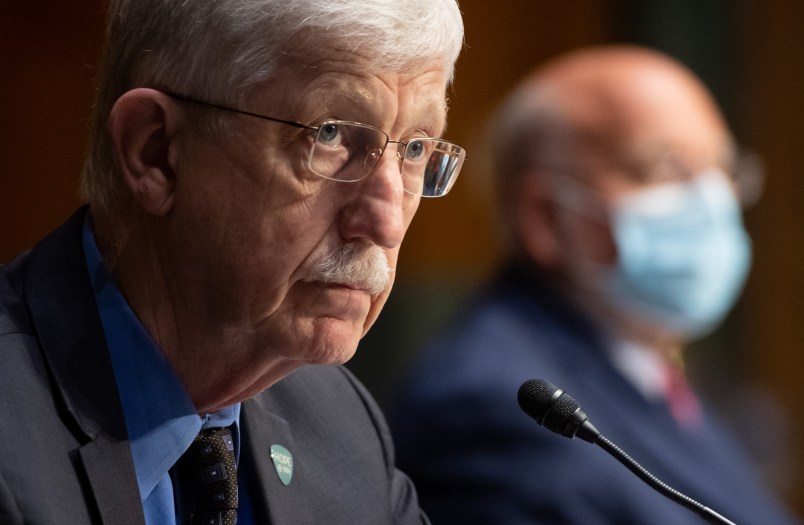National Institutes of Health Director Dr. Francis Collins said Wednesday that public hesitation about getting a vaccine to protect against coronavirus has been “enhanced” by what he called an “unfortunate mix of science and politics,” adding that politicization concerns need to be urgently addressed to put to rest public mistrust.
“Those who are vaccine hesitant have had their hesitancy enhanced by a variety of things that are happening right now, particularly the unfortunate mix of science and politics,” Collins said at an event hosted by the National Academies of Sciences, Engineering and Medicine.
In a recent poll, the Kaiser Family Foundation found that more than half of respondents said they would not get the vaccine even if it was available and offered for free ahead of the November election. A majority of respondents (62 percent) also fear that political pressure from the Trump administration will lead the Food and Drug Administration to rush to approve a COVID-19 vaccine before ensuring its safety and efficacy, the poll found.
“I don’t want to have us, a year from now, having a conversation about how we have in our hands the solution to the worst pandemic of more than 100 years, but we haven’t been able to actually convince people to take charge of it,” Collins said.
Dr. Anthony Fauci a top infectious diseases expert and the director of the National Institute of Allergy and Infectious Diseases told the Wall Street Journal in an interview on Wednesday that vaccine won’t help reduce the spread of the virus if few people opt to be vaccinated.
“It’s a combination of how effective a vaccine is and how many people use it,” Fauci said, adding that the “full important effect of having a vaccine,” can only be realized when more people are vaccinated.
His remarks come as an internal memo from the Federal Emergency Management Agency obtained by ABC News on Wednesday night showed that while the current national trend in new COVID-19 cases has dropped only slightly, the trend in new deaths is way up.
Between Sept. 9 and Sep. 15, a total of roughly 5,900 coronavirus-related deaths were recorded marking an increase of close to 17 percent compared with the death toll of seven days prior, the FEMA memo suggests.
Last week, Fauci pushed back on President Donald Trump’s rosy picture of the country “rounded the turn” on the COVID-19 crisis, saying that the statistics were “disturbing” and that the number of new cases which was leveling off at about 40,000 new cases daily needed to be dramatically decreased going into the colder months as Americans spend more time indoors.
President Donald Trump has repeatedly said that a vaccine could be available before the Nov. 3 election. He reissued that claim in remarks on Wednesday, contradicting a separate assessment by CDC director Dr. Robert Redfield who told a Senate committee that a vaccine would not be widely available until the middle of next year.
“I think he made a mistake when he said that,” Trump told reporters. “It’s just incorrect information.” A vaccine would go “to the general public immediately,” Trump said, adding that “under no circumstance will it be as late as the doctor said.”
Fauci has said in separate interviews corroborating the remarks made by Redfield, that he, too, anticipates a vaccine will only be ready and proven effective toward the end of the year or beginning of 2021. He told MSNBC on Friday that widespread distribution of a vaccine and a return to something that resembles “normality” would likely not occur until the middle or end of next year.



